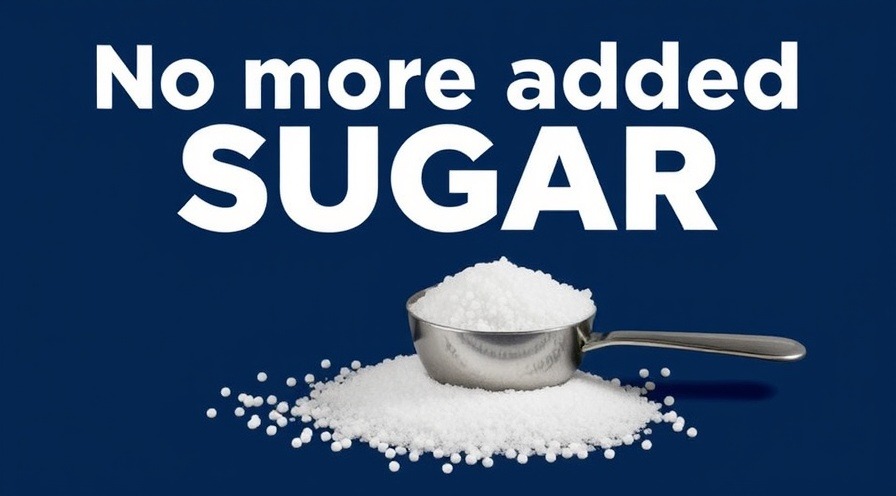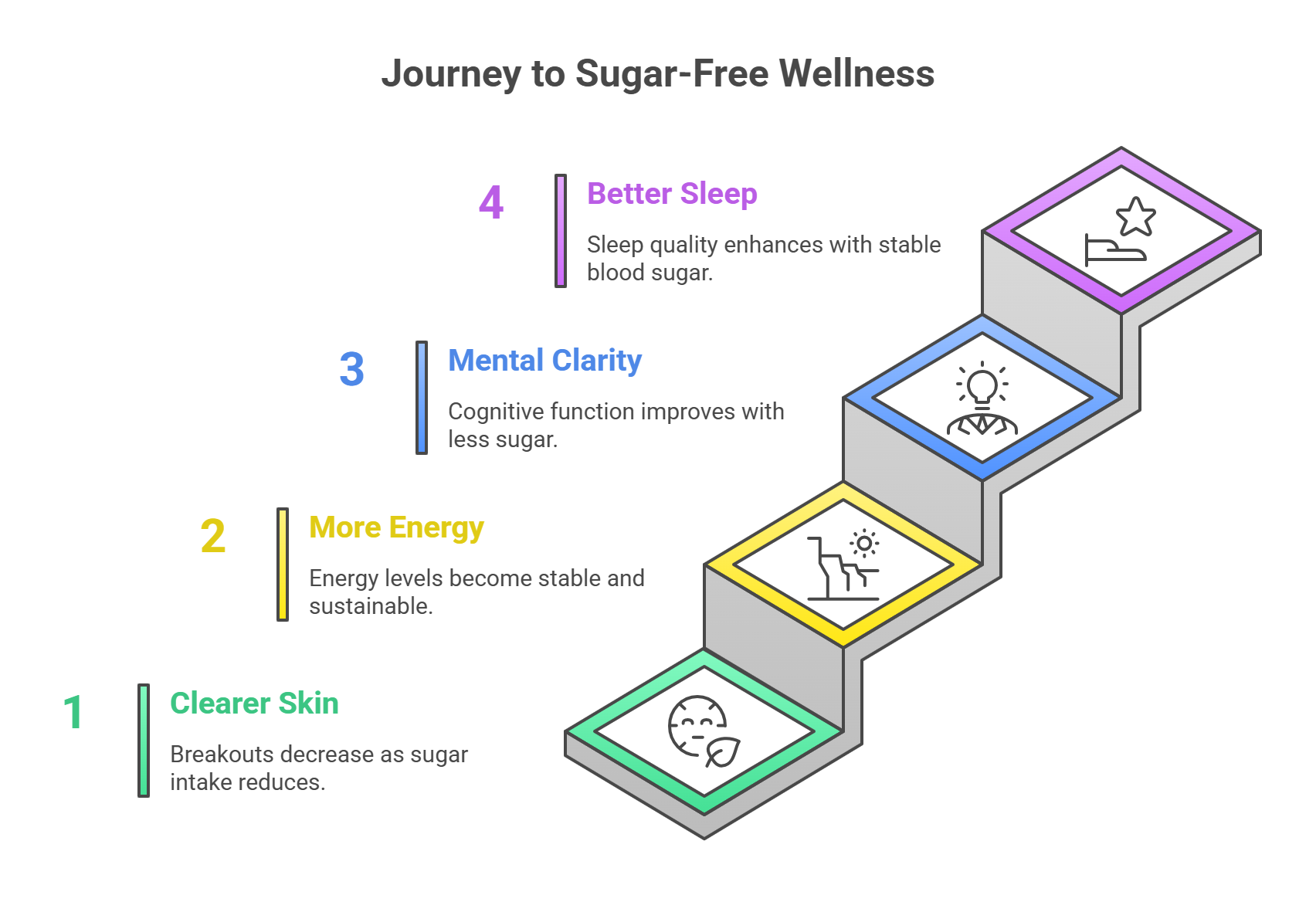
What Happens When You Quit Sugar? (Spoiler: Your Body Sends You Thank You Notes)
You’ve probably heard that quitting sugar is great for your health—but what actually happens when you do it? Does your skin glow like you’ve been kissed by a wellness fairy? Does your energy skyrocket? Do cravings vanish into thin air?
Sort of. But also... not right away.
Let’s break it all down so you know what to expect—minus the fear, guilt, or guilt-fueled chocolate binges. This is your realistic, researched, and relatable guide to quitting sugar.
Why Quitting Sugar Is a Game-Changer for Your Health
Let’s be blunt: sugar is delicious, but it’s also a sneaky little health saboteur. According to the American Heart Association, the average American consumes 77 grams of added sugar per day—more than triple the recommended amount for women (25g) and double for men (36g).¹
Dr. Robert Lustig, a pediatric endocrinologist and professor at UCSF, famously called sugar “the most dangerous drug of our time.”² (Yeah, that serious.)
When you quit or drastically reduce sugar, here’s what starts changing almost immediately:
Blood sugar levels stabilize, which helps reduce your risk of type 2 diabetes.
Your liver gets a break, as excess fructose is a known contributor to fatty liver disease.
Your gut microbiome starts healing, improving digestion, mood, and immunity.
You stop riding the blood sugar rollercoaster, meaning fewer crashes, brain fog, and afternoon hangry episodes.
In short? Your body breathes a sigh of relief.
The Long-Term Benefits to Your Wellness
So, what happens after those initial sugar cravings pass and the detox headaches fade?
You enter sugar-free superhero mode.
✔ Clearer Skin
Breakouts often decrease when you ditch sugar. A 2016 study in the Journal of the Academy of Nutrition and Dietetics found a link between high glycemic diets and acne.³ No, quitting sugar isn’t the same as hiring a facialist, but your skin will likely thank you.
✔ More Energy, All Day Long
Without the constant spike-crash cycle of sugar, your energy becomes more even and sustainable. You'll feel like less of a zombie by 3 p.m. Imagine—actual energy, without needing a candy bar.
✔ Improved Mental Clarity
Sugar has been shown to negatively impact memory and cognitive function. In fact, a 2015 study published in Neuroscience found high sugar intake may impair hippocampal function—the brain’s memory center.⁴ Translation? Less sugar, sharper brain.
✔ Better Sleep and Mood Stability
No more late-night sugar crashes or mid-morning emotional whiplash. Stable blood sugar = better sleep and a more emotionally even keel. (Even Karen from accounting can’t ruin your vibe now.)

What to Expect (a.k.a. The Not-So-Fun Detox Phase)
Let’s not sugarcoat this (ha!): quitting sugar can be rough at first.
You may experience:
Headaches
Mood swings
Fatigue
Cravings that feel like your body is screaming for a brownie
This phase can last 3–10 days depending on your previous sugar intake, according to registered dietitian Brooke Alpert, co-author of The Sugar Detox.⁵ But stick with it—those symptoms will pass.
Pro tip: hydrate, eat plenty of protein and healthy fats, and sleep like it's your full-time job.
Alternatives to Sugar (That Don’t Taste Like Sadness)
Here’s the deal: going sugar-free doesn’t mean you can never have anything sweet again. There are plenty of better-for-you alternatives that don’t spike your blood sugar.
Natural Sweeteners
Stevia: Zero-calorie and plant-based. Just watch out for the aftertaste.
Monk Fruit: Calorie-free and sweet like sugar, without the glycemic impact.
Raw Honey: Contains antioxidants and nutrients (use sparingly).
Dates: Nature’s candy—high in fiber and naturally sweet.
Sweet Snacks That Won’t Wreck You
Dark chocolate (80% or higher)
Fruit with nut butter
Frozen banana “nice cream”
TL;DR – Quitting Sugar: The Sweet Truth
Yes, quitting sugar is hard. You might get cranky. You might dream about donuts. But the long-term benefits—from better skin to sharper focus to genuine all-day energy—are so worth it.
Need a little motivation? Check out the YouTube video from Dr. Becky Gillaspy embedded below—it’s a quick, summary of the ways sugar can ruin your days. Consider giving added sugar the boot. Your future self (and your pancreas) will thank you.
Other Sources:
American Heart Association – Added Sugars
Dr. Robert Lustig – Sugar: The Bitter Truth, UCSF Lecture
Burris J et al., 2016. Journal of the Academy of Nutrition and Dietetics
Kanoski SE, Davidson TL. 2015. Neuroscience
Alpert, Brooke, and Patricia Farris. The Sugar Detox: Lose Weight, Feel Great and Look Years Younger
Disclaimer: The information provided on this website is for general informational purposes only and should not be considered medical advice, diagnosis, or treatment. Always consult a qualified healthcare professional before making any decisions or taking actions related to your health, including but not limited to medical conditions, treatments, diets, supplements, or exercise programs. The content on this site is not intended to replace professional medical guidance. The website and its authors are not responsible for any actions taken based on the information provided. Ask your doctor or licensed medical professional.
 Add Row
Add Row  Add
Add 




 Add Row
Add Row  Add
Add 

Write A Comment